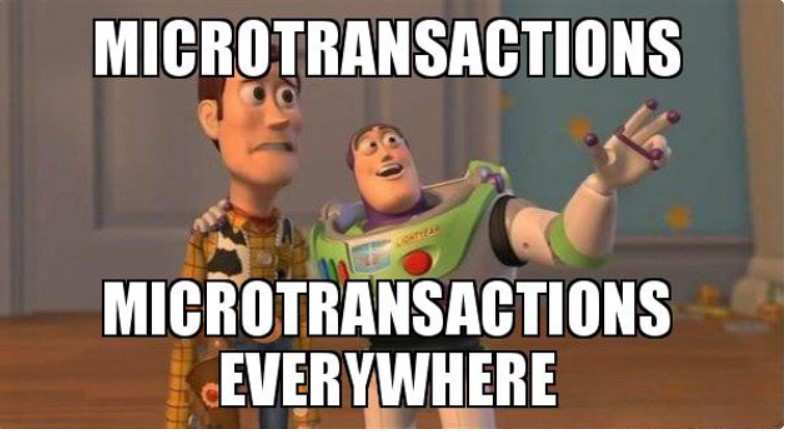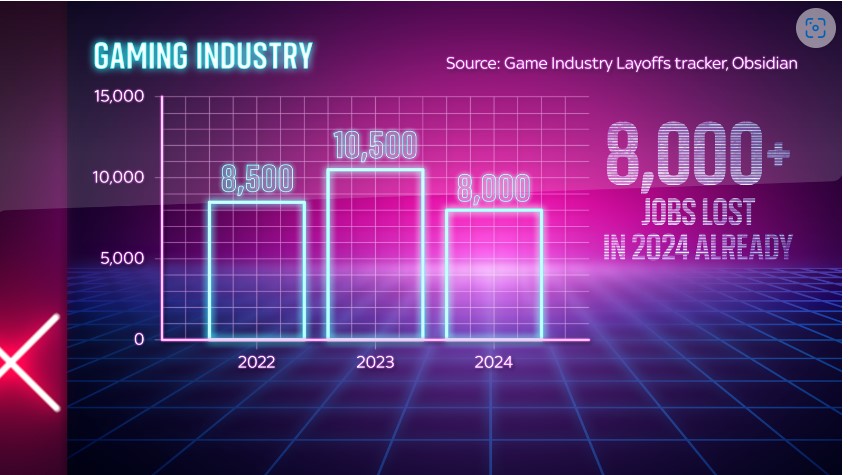By Joe Langabeer – Hastings and Rye Labour member
The video game industry is experiencing a period of turbulence in its workforce. Over the past four months, around 8,000 people have lost their jobs in the industry, and in the past 18 months, over 20,000 employees have been laid off.
As per a report by Sky News, the UK has been hit the hardest, with more than one in 30 individuals working in video games being affected. Furthermore, Sony Studios, makers of Play Station hardware, have had its physical offices shut down in London, leading to additional layoffs.
While industry insiders blame the COVID-19 pandemic, game publishing delays, and the high cost of living, there is a deeper issue at play – greed is at the heart of the video game crisis.
The Crash
The video game industry has experienced a healthy upward trend in the past 40 years. After the video game crash of 1983, which was caused by the poor quality of many video games being released on home consoles, the industry refocused and prioritised making fewer consoles and more high-quality video games. Emerging companies like Microsoft and Sony helped limit the number of games produced on their consoles and popularised quality over quantity.
Since then, the economic value of video games has been on an unprecedented rise and continues to grow. In fact, according to MarketWatch, video games have become a bigger industry than movies and North American sports combined. This growth was partially due to the pandemic, which kept people indoors and led to a rise in sales estimated at £200 billion.
However, there are now indications that sales and profit will start to slow down. The Financial Times reported on February 17th that the video game industry is about to experience its biggest economic “slowdown” in 30 years because it is unable to sell the hardware needed for people to play video games. Sony recently cut its sales forecasts and is now implementing austerity measures by reducing its workforce and limiting the number of video games it produces.

Layoffs
It has recently been reported that Take-Two Interactive, the publisher behind the popular game Grand Theft Auto 5, is planning to cut around 5% of its workforce. This amounts to approximately 579 jobs, and the company is also abandoning “several” in-development games they previously worked on. This move comes even though the company made a profit of £2.2 billion last year and recently acquired another video game developer, Gearbox.
Initially, the CEO Strauss Zelnick had stated that there were no plans to lay off employees and that the company was instead going through a planned cost reduction program. However, Take-Two is doing this to keep their profits rising while having a smaller workforce to complete the next Grand Theft Auto game, which is expected to be released next year. This is seen by many as an example of exploiting capitalism to maintain profits, leading to talented developers losing their jobs and ultimately resulting in a worse product for the consumer.
Greed in the system
There are multiple ways in which video game development companies are demonstrating capitalist greed. Companies such as Electronic Arts, Ubisoft, Activision, Take-Two Interactive, Sony, and Microsoft have been known to exploit their consumers and workforce. According to Bloomberg reporter Jason Schrier, there is a “crunch” culture in video game development, where developers are required to work overtime, often resulting in 12-14 hour workdays 6-7 days a week. This leaves little time for them to see their families or have a social life to finish developing a video game. This “crunch culture” has led to video game developers experiencing mental health issues and divorces.
Moreover, there have been high-profile cases of sexual harassment, gender discrimination, and bullying in the workplace, particularly within companies such as Activision, who are known for their “frat boy” culture. Ubisoft has also faced similar accusations, indicating the terrible treatment of their workforce. There is a pressing need for a change in the working conditions of these companies.
Another issue is the evolving market trends and how these companies treat their consumers. Sony has long been known for producing quality games for consumers but has recently shifted towards a “live service” model for their products. A live service model is where the game is continually monetised through content updates, supposedly expanding the game’s life and potentially lasting for decades.
However, this model has become more exploitative, with companies incorporating “micro-transactions” where players pay real money to have in-game items. These micro-transactions are often used to customise your character, but they have become increasingly exorbitant. Companies charge anywhere from £50-100 for one colour on a gun you might use in the game. This is the case with popular games such as Valorant.

These micro-transactions can also affect gameplay, providing a “pay-to-win” service where players can beat others by making real-money purchases to improve their weapons or abilities in the game. Take-Two Interactive even added an in-game casino in the online version of Grand Theft Auto 5, where players can pay real money to bet on in-game money or items. This is a reality of the video game industry that feeds off of exploitation.
In June 2020, a select committee report was presented to parliament, urging the Department of Digital, Culture, Media, and Sport to explore the effects of gambling in video games. However, there has been little development in this area. The microtransactions in video games are exploitative and prey on the same people who are affected by the gambling industry. There are currently few safeguarding measures to protect consumers.
Unionisation
There is a growing resistance against using AI in video games, both within the industry and among consumers. Video game developers and workers are trying to form unions, following the example of SAG-AFTRA strikes in America. Layoffs and the increasing use of AI in video games are significant concerns. Many unions, such as the one formed at Activision, have been initiated by quality assurance workers, who have been subjected to the most abuse and least job security.
However, companies such as Activision have tried to stop workers from forming unions by using legal measures. Despite this, workers have come together and succeeded in creating a union at Activision. Organisers of these unions call for rapid action among workers to organise against the threat of more layoffs and the continued use of AI in the industry.
There is also a push from social media and smaller gaming communities to “vote with their wallet” and not pre-order games. This practice creates an awareness of the exploitative practices in video games and helps to improve their quality. However, I would argue that this approach is impractical as most people are not well-informed about the gaming industry and will buy the games they like.
Micro-transactions exploit young people and are similar to gambling. Companies that use these tactics care only about their bottom line and will not stop without government intervention.
We should support workers trying to unionise and pressure companies to remove micro-transactions from video games and we must also pressure governments to enact laws to protect consumers from these practices and ensure companies stop exploiting their customers.



